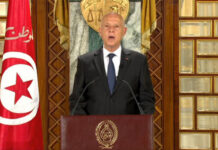In a press release published this Tuesday, September 14, 2021, on its official Facebook page, the organization I Watch indicated that the exceptional measures taken, even if they are within the framework of the Constitution, as underlined by the President of the Republic, they must aim to “ensure the return to normal functioning of the machinery of the State as soon as possible” so that we do not say that “he treated us and harmed us”, especially in a context of the total paralysis which affects many state institutions: the parliament and the presidency of the government.
The organization also called on the President of the Republic to clarify the reasons for the delay in lifting these exceptional measures, as stipulated in article 80 of the Constitution.
According to the same source, the assertion by the head of state of his “respect for the Constitution and his intention to modify it, but according to what procedures”, contradicts the measures he has taken. It is not possible to amend the Constitution when the activities of Parliament are frozen, in accordance with Articles 143 and 144 of Chapter Eight of the Constitution, “if the role of the Constitutional Court is once again neglected. ”
For its part, Human Rights Watch pinned Kais Saïed on human rights violations in an article published on September 11, 2021.
Arbitrary and politically motivated acts of repression have increased in Tunisia since July 25, 2021, when President Kais Saied suspended parliament, lifted the parliamentary immunity of deputies, sacked the head of government and took control of the government. prosecution, lamented the organization Human Rights Watch.
According to Deputy Director of the Middle East and North Africa Division at Human Rights Watch Eric Goldstein: “President Saïed’s assurances about human rights ring false, since he concentrates all power in his hands. Parliamentarians and other Tunisians suddenly begin to face arbitrary restrictions on their freedom, and some are thrown in jail ”
For the media abroad (especially French and American newspapers), some articles converge on a single point: concern and fear of “authoritarian drift”.
The French newspaper “Liberation” published an article on September 13, 2021, entitled “Liberties victims of the President’s clean hands operation.” According to this article, “Supported by the majority of Tunisians, Kais Saied, who assumed full powers at the end of July, continues his anti-corruption crusade. But judges, lawyers and opponents fear an “authoritarian drift”. Parliament could be dissolved as early as Monday ”
To the question “do Tunisians still want democracy? “The American newspaper Washington Post, writes, on September 2, 2021, that” to better understand these contradictory results, Milan Svolik and I interviewed a representative sample at the national level of 1,200 Tunisians immediately after the election of Saied in 2019 , using a face-to-face survey conducted by Elka Consulting. We found that on average, Tunisians perceived that the political transition had brought more political freedoms, more corruption, more unemployment, higher fuel prices, more violent crimes and less personal and financial security. “











